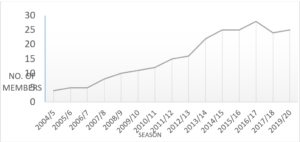Brief Background
Agriculture remains the mainstay of Malawi’s economy, accounting for about 30 percent of Gross Domestic Product (GDP) and generating over 80 percent of national export earnings (Annual Economic Report, 2015). It also provides employment to about 80 percent of the rural population, which is dominated by small-scale farmers. In any agricultural production systems, seed of high quality remains the most critical input and must be accessible and affordable when required. The Government of Malawi recognizes the importance of high quality seed of improved crop varieties for improved productivity, food and nutrition security. As such the government develops various legislations to create a conducive environment for seed industry growth and enhanced availability of high quality seed to farmers.
The government established the Seed Services Unit (SSU) in the Department of Agricultural Research Services (DARS) of the Ministry of Agriculture, Irrigation and Water Development (MoAIWD) as the official seed certification office in 1976. The Unit guided by the 2018 seed policy and empowered by the 2022 Seed Act is mandated to ensure that high quality seed of improved crop varieties is produced and made available to the farming community. The head office is located at Chitedze Research Station in Lilongwe, and its seed testing laboratory is accredited to the International Seed Testing Association (ISTA) since 1982. The Unit is in the process of getting accreditation to Organization for Economic Corporation and Development (OECD). SSU has three satellites at Lunyangwa Research Station in the North, Lifuwu Research Station along the lake shore and Bvumbwe Research Station in the South to cater for seed producers in the three regions.
The Growth of Seed Industry
Malawi has seen increase in number of industry players since 2005 with the introduction government input subsidy program where resource poor farmers are targeted to access fertilizer and seed at subsidized prices through the voucher system. Maize and legume seed since 2005 have been accessed by famers in huge volumes and in past three years government has included Sorghum and Rice as certain districts are the main food crops. To respond to increased seed demand the number of seed companies has increased to 25 from just 5 in 2005. There has also been increase in number of agrodealers to handle the increased volume of seed due to the farm input subsidy program. To handle the increase in certification services required, the government trained para seed inspectors to ensure that seed fields are adequately inspected. There are now proposals to accredit licensed private seed inspectors and increase their scope to further ease the workload and ensure high quality seed production in Malawi. On average 1.2million ha is put under maize grain production and 180 thousand ha beans and groundnuts each and about a 100 thousand ha of Soya. These are main crops whose seeds are bought by farmers in huge volumes. There are also promising crops that are being promoted such as sunflower, chickpeas sesame etc. The market also exists in vegetable sub sector as all seeds are being imported.
Graph Showing number of seed companies in Malawi as of 2023

